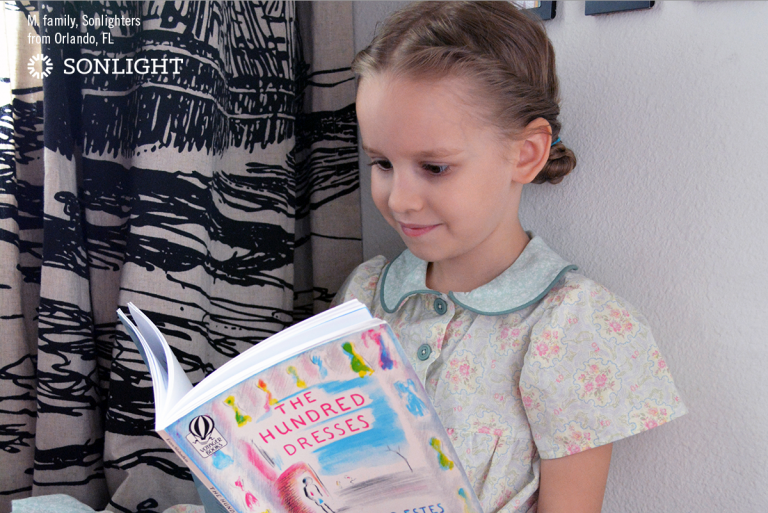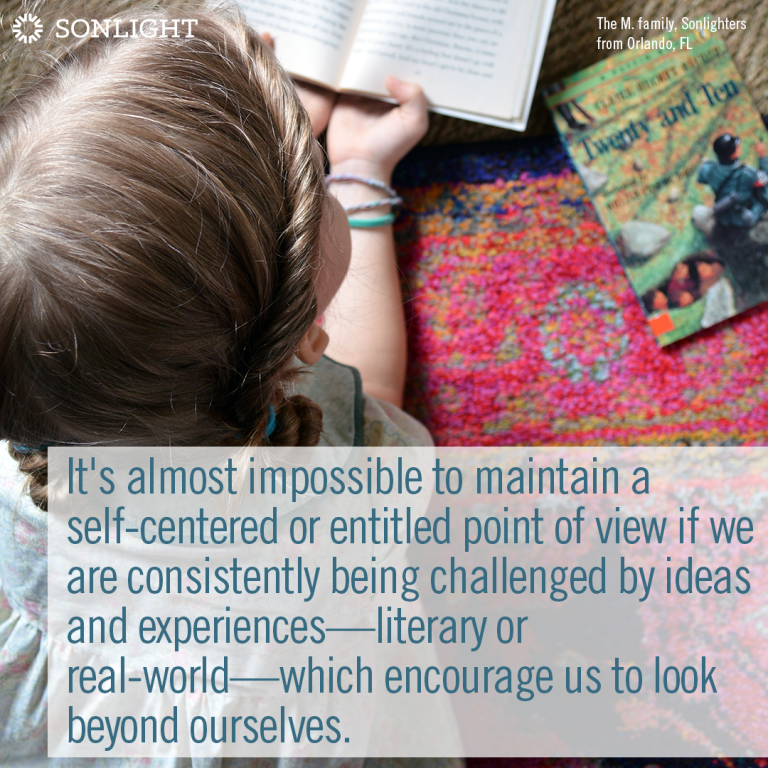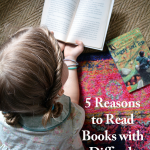
As far back as I can remember, I was one of those voracious readers who read everything:
- the publisher’s mailing address printed in the beginning of books
- the ISBN numbers
- every foreword and epilogue—yes, even the appendices
- the writing on toothpaste tubes
- labels on cans of soup and the inside of shoes
I read literally everything. I clearly remember being excited to turn four, because then I could read four verses from the KJV version of the Bible each morning instead of just three. (I now realize how abnormal this was.)
Because I read so early and because we were a missionary family living abroad, I very quickly ran out of children’s books in English. So I read a lot of books beyond my age—difficult books intended for adults, dealing with slavery and martyrdom and theology and other tough topics most children aren’t grappling with.
While I’m not sharing those specific books with my own little girl, I don’t regret reading them. But I find myself drawn to Sonlight, because Sonlight doesn’t shy away from books with difficult topics. Unlike the heady books I stuck my nose in as a child, Sonlight uses kid-friendly books to gently introduce tough topics in non-anxiety-inducing ways. These books are my favorite—the ones which weave a redemptive thread through tragedy, create beauty from ashes, and lift up our hearts in the process.
Books which deal with difficult topics are important because they cause us to look up and away from ourselves, and give us a little nudge out of any selfishness which might have settled down around us. When we read books in which the main characters combat grief, hunger, or other struggles, our gaze is lifted outward. It's almost impossible to maintain a self-centered or entitled point of view if we are consistently being challenged by ideas and experiences—literary or real-world—which encourage us to look beyond ourselves.
1. When we read books with difficult topics, we learn empathy.
Difficult books give us a better understanding of what life is like outside our own comfort zone. Reading allows us to put ourselves in the place of the main character—for example, to feel a tiny taste of what it must have been like to be unjustly uprooted from the community and endure the shame of internment at Manzanar. The impact of what we read stays with us for a lifetime, long after the last chapter has ended.
2. When we read books with difficult topics, we learn gratitude.
Books set in times gone by have a way of encouraging gratitude by reminding us that the ordinary things in our lives actually quite luxurious. In times when we're feeling overwhelmed by the size of the laundry pile, we can remember Wanda Petronski's single, threadbare dress in The Hundred Dresses. Suddenly, folding multiple clean outfits invokes gratitude, not disdain.
3. When we read books with difficult topics, we learn perspective.
These books help us shut down self-pity and battle a sense of entitlement by asking us to rethink our sense of normalcy. On those tiring days when caring for children feels like herding cats while running endlessly on a hamster wheel—we can think back to Twenty and Ten, and breathe a prayer of humbled thankfulness that we are not sheltering children in wartime. Reading about suffering puts our own woes in perspective.

4. When we read books with difficult topics, we learn to nurture prayerful contentment.
If George Müller can sit down to an empty breakfast table and genuinely thank God for food that's not even there, we can be content with what we have. As a child, I thought of George Müller every time I didn’t like the dinner my mom made, and as an adult, I am gently reprimanded when I think of him and realize I am in no place to complain about having to go run grocery errands.
5. When we read books with difficult topics, we learn to temper our complaints.
The best books don't paint an inaccurately rosy view of life, but rather equip us to the challenges which will inevitably come our way. If Joy Riderhoff can turn her years-long illnesses and disappointments into an opportunity to serve, we have no right to whine about the temporary inconvenience of allergies or a stuffy nose. (Guilty of that one!)
No matter our age, we can gain a helping hand from stories like these. We don’t have to read only challenging books, of course, but we shouldn’t be afraid of them. We shouldn’t fear exposing our children to a bit of tempered, age-appropriate suffering via the written page. Widening our awareness of the world and opening our eyes to problems far larger than our own helps keep the ungrateful heart at bay.
And in the end, by God's grace and with His help, may we (even in the truly tragic and heart-rending trials and tribulations) be able to say, "our light and momentary troubles are achieving for us an eternal glory that far outweighs them all." (2 Corinthians 4:17, NIV)
All for His Glory!
Curious to see what this type of education might look like for your family? Go to SmoothCourse to explore your options.









I love this and love Sonlight for this very reason. I've been working my way through the readers for the coming school year and am enjoying them so much and look forward to sharing them with my daughters. It opens my eyes and I am so glad to have such a great curriculum.
I've also used their summer reading packages as gift giving ideas for my voracious readers and have never been steered wrong!
The summer readers have become some of our absolute favorite books, too!